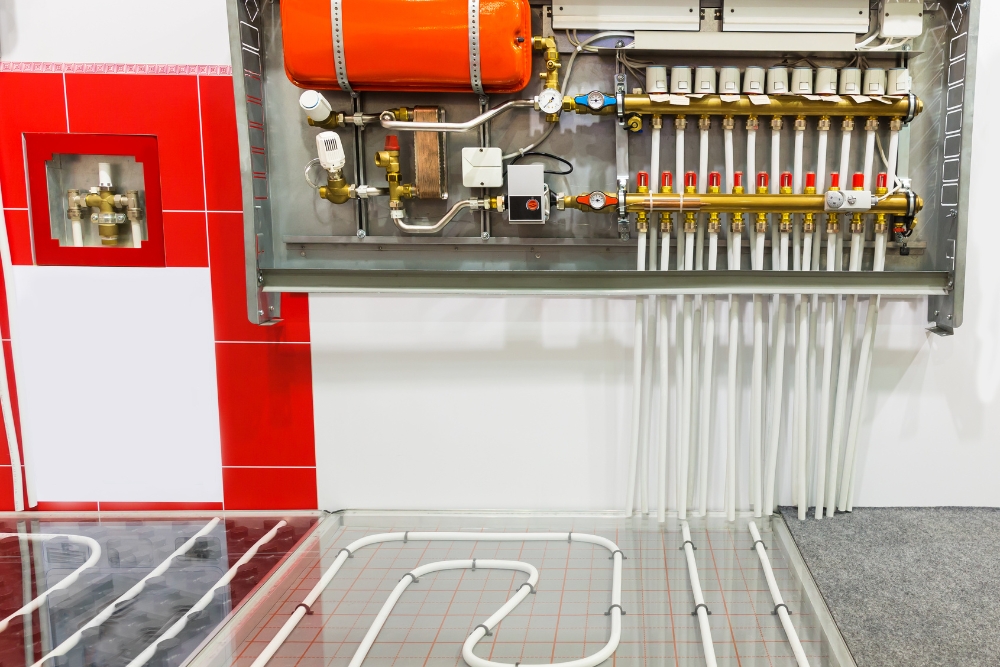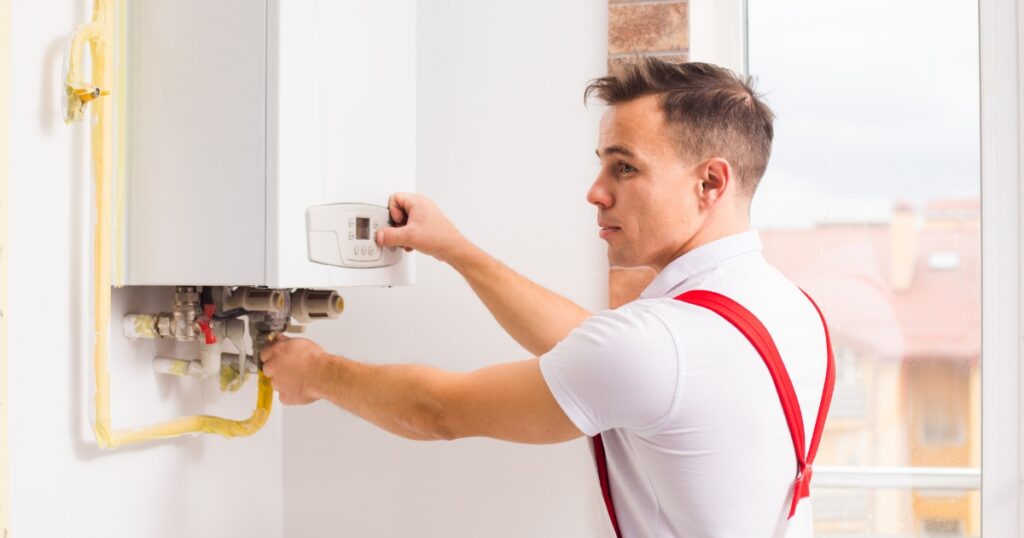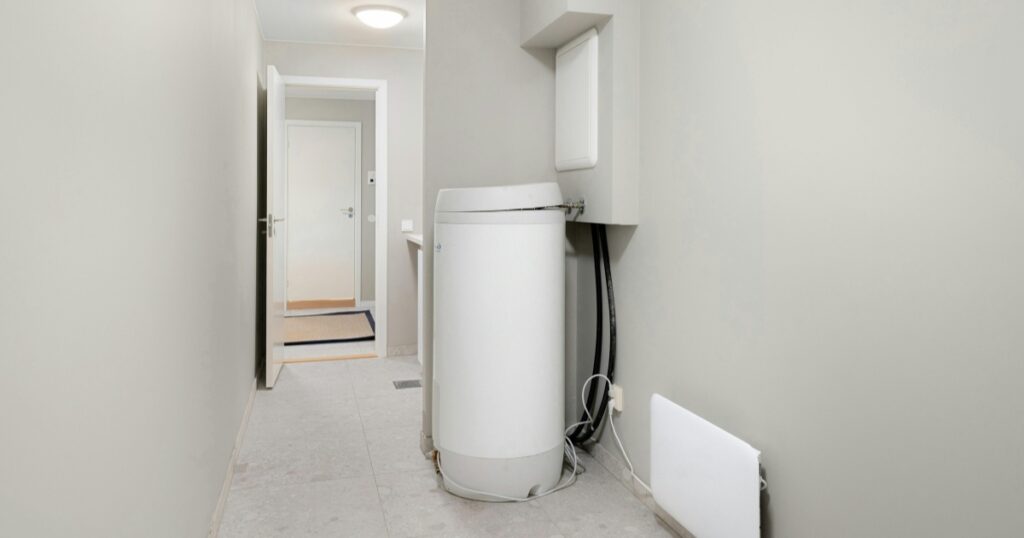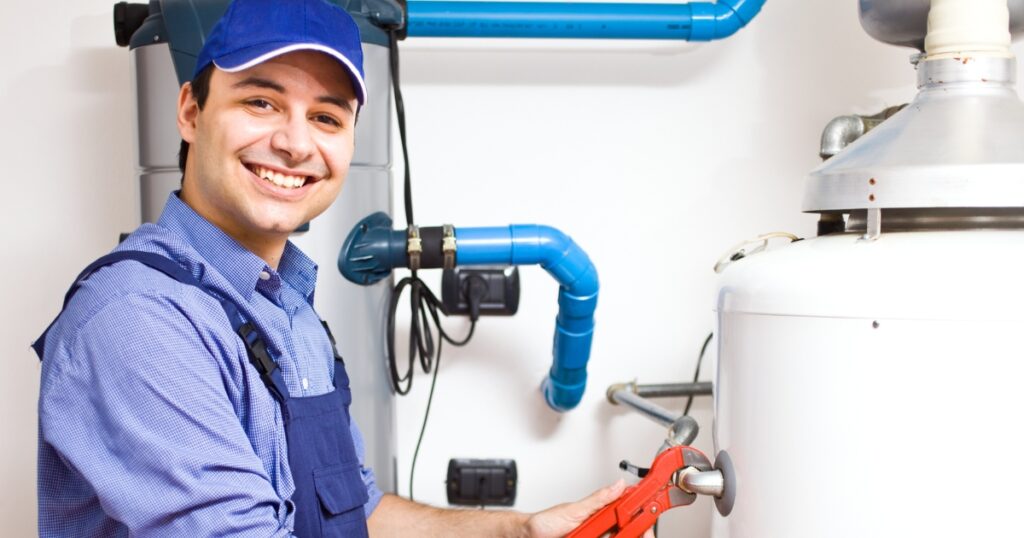Dealing with a dodgy hot water system can truly give you the pip. We’re all too familiar with this kind of frustration – it’s enough to kick up a stink over, really. After knuckling down into this issue, we found out that leaks are one heck of a common problem for us regular Aussies at home.
This blog post will be your mate in helping diagnose and sort out these and other irritating issues with your hot water system. So let’s get cracking, shall we?
Key Takeaways
- Common hot water system problems include no hot water, insufficient hot water, water temperature too hot, slow heating, low water pressure, and hot water leaks.
- Troubleshooting and repairs for these problems may involve checking for leaks, adjusting temperature settings, flushing the water heater, replacing faulty heating elements, fixing water pressure issues, and repairing or replacing leaking components.
- Regular maintenance is important to prevent hot water system problems and ensure optimal performance.
Common Hot Water System Problems
– No hot water: This problem occurs when the hot water system fails to produce any hot water at all.
– Insufficient hot water: This issue arises when there is not enough hot water being supplied, leading to discomfort during showers or other tasks.
– Water temperature too hot: If the water coming out of your faucets is scalding or dangerously hot, this can be a sign of an issue with the thermostat or temperature control.

– Slow heating: When it takes longer than usual for your hot water system to heat up, it could indicate a problem with the heating elements or sediment buildup in the tank.
– Low water pressure: If you notice a decrease in water pressure coming from your taps, this could be due to issues with the pipes or valves connected to your hot water system.
– Hot water leaks: Leaking pipes or valves can cause not only wasted energy but also potential damage to your home.
No hot water
Experiencing a lack of hot water can be quite frustrating. It’s often due to problems with the internal components of your hot water system. The culprits could include faulty heating elements or a malfunctioning thermostat.
Sometimes, simpler issues like a tripped circuit breaker might be the cause. These problems might seem overwhelming, but they’re usually manageable and fixable with some basic troubleshooting or assistance from professional plumbers.
Don’t panic or rush to replace your entire system; it may just need some careful diagnosis and repair.
Insufficient hot water
If you’re experiencing insufficient hot water, it can be quite frustrating, especially when you need a warm shower or want to wash your dishes. There are several reasons why this problem may occur.
One common cause is a malfunctioning thermostat, which regulates the temperature of the water. Another possible reason is a faulty heating element that isn’t able to heat the water effectively.
Sediment buildup in the tank can also reduce hot water production. To fix this issue, you may need to adjust the thermostat settings or replace faulty components such as thermostats or heating elements.
The water temperature is too hot
If you find that the water temperature from your hot water system is too hot, it can be a cause for concern. Not only can excessively hot water be uncomfortable to use, but it can also pose a safety risk, especially if there are children or elderly individuals in your household.
One possible reason for this issue could be a malfunctioning thermostat, which fails to regulate the temperature properly. Another potential cause could be a faulty tempering valve, which is responsible for mixing cold and hot water to achieve the desired temperature.
In either case, it’s important to address this problem promptly to prevent any accidents or discomfort. Seeking professional assistance from licensed plumbers would ensure accurate diagnosis and repair of the hot water system’s temperature regulation issues.
Slow heating
If you notice that your hot water takes a long time to heat up, it could be an indication of a problem with your hot water system. There are several possible causes for this issue.
It could be due to sediment buildup in the tank, which can affect the efficiency of heating. Another possibility is a faulty thermostat or heating element that is not functioning properly.
In some cases, insufficient water pressure may also be a factor in slow heating. If you experience this problem, it’s best to have a professional plumber inspect and repair your hot water system to ensure optimal performance.
Low water pressure
If you are experiencing low water pressure in your hot water system, there could be a few possible reasons. One common cause is a clogged or blocked pipe that restricts the flow of water.
Sediment buildup in the pipes or a faulty pressure-reducing valve can also lead to low water pressure. To fix this issue, you may need to clean or replace the affected components. It’s important to address low water pressure promptly as it can affect the performance and efficiency of your hot water system.
Hot water leaks
Hot water leaks can be a frustrating issue for homeowners. Not only do they waste water, but they can also lead to damage if left unaddressed. Leaking pipes or fittings are often the culprits behind hot water leaks.
It’s important to check for visible signs of leakage, such as puddles or damp spots near your hot water system. Additionally, keep an eye out for any unusual increases in your water bill, as this may indicate a hidden leak.
If you notice a hot water leak, it is recommended to call a professional plumber who can locate and repair the source of the problem efficiently and prevent further damage.

Troubleshooting and Repairs
– Checking for water leaks: Inspect all visible pipes and connections for any signs of leakage, such as puddles or dampness.
– Adjusting temperature settings: Use the thermostat to set the desired hot water temperature. Ensure it is not set too low or too high.
– Flushing the water heater: Drain and flush the tank regularly to remove sediment buildup that can affect heating efficiency.
– Replacing faulty heating elements: If there is no hot water or slow heating, a malfunctioning heating element may need to be replaced.
– Fixing water pressure issues: Check for clogged filters, closed valves, or inadequate supply pressure that can cause low water pressure in your system.
– Repairing or replacing leaking components: Address any leaks promptly by repairing or replacing damaged pipes, valves, or seals.
Checking for water leaks
To determine if your hot water system has a leak, start by inspecting the area around the unit for any signs of water or moisture. Look for puddles, dampness on walls or ceilings, and water stains.
Additionally, check the pipes and connections leading to and from the system for any visible leaks or drips. Don’t forget to examine the floor underneath the unit as well.
If you suspect there’s a leak but can’t find any visible signs, try turning off all taps in your home and monitor your water meter for movement. If it continues to increase even when no one is using hot water, it could indicate a hidden leak within your system.
Adjusting temperature settings
To ensure your hot water system is functioning optimally, it’s important to adjust the temperature settings. If you find that your water is too hot or not hot enough, adjusting the temperature can rectify this issue.
You can do this by locating the thermostat on your hot water system and adjusting it accordingly. Be sure to refer to the manufacturer’s instructions for guidance on specific temperature ranges.
By adjusting the temperature settings, you can enjoy a consistent and comfortable supply of hot water throughout your home.
Flushing the water heater
To prevent sediment buildup in your hot water system and ensure optimal performance, it is important to flush the water heater regularly. Sediment can accumulate over time and affect the efficiency of your system, causing slow heating or even damage to the heating elements.
Flushing the water heater helps remove these deposits and keeps your hot water flowing smoothly. It’s a simple process that involves draining the tank and flushing it out with clean water.
By performing this maintenance task on a regular basis, you can extend the lifespan of your hot water system and avoid potential problems down the line.
Regularly flushing your water heater is an essential step in maintaining its efficiency. Over time, sediment can build up at the bottom of the tank, reducing its ability to heat up properly.
Replacing faulty heating elements
If your hot water system is not heating up properly, it could be due to faulty heating elements. These elements are responsible for heating the water inside the tank. Over time, they can wear out or develop malfunctions, leading to a decrease in hot water production.
Replacing these faulty heating elements can help restore the proper functioning of your hot water system and ensure that you have a steady supply of hot water when you need it. Remember to consult a licensed plumber who can identify and replace the faulty heating elements efficiently and safely.
Fixing water pressure issues
If you’re experiencing low water pressure in your hot water system, there are a few steps you can take to fix the problem. First, check for any obstructions or blockages in the pipes leading to your hot water system.
Clearing out these blockages can help improve water flow and increase pressure. If that doesn’t solve the issue, you may need to adjust the pressure regulator valve on your hot water system.
This valve controls the amount of pressure that enters your home’s plumbing system. Finally, if all else fails, it’s best to call a licensed plumber who can diagnose and repair any underlying issues with your hot water system that may be causing low water pressure.
Repairing or replacing leaking components
To fix hot water system leaks, it is important to repair or replace the leaking components. Leaks are a common problem that can occur in different parts of the system, including pipes, valves, and fittings.
If you notice any signs of a leak such as water pooling around the system or dampness on walls or floors, it’s crucial to take action promptly. Start by identifying the source of the leak and assess if it is something that can be repaired or needs replacement.
Depending on the severity of the issue and your DIY skills, you may need to consult a licensed plumber for assistance.
Importance of Regular Maintenance
Regular maintenance is crucial to prevent hot water system problems, extend its lifespan, and ensure optimal performance. Don’t wait for issues to arise; read more about the importance of regular maintenance for your hot water system.
Preventing problems through maintenance
Regular maintenance is key to preventing problems with your hot water system. By taking care of your system and keeping it in good condition, you can avoid common issues and extend its lifespan.
It’s important to schedule regular maintenance checks by a licensed plumber who can inspect the system, flush out any sediment buildup, check for leaks, and ensure that all components are functioning properly.
In addition, make sure to follow manufacturer guidelines for maintenance tasks you can do yourself, such as adjusting temperature settings or replacing filters if necessary. With proper care and attention, you can enjoy uninterrupted hot water and avoid costly repairs down the line.
Extending the lifespan of the hot water system
Regular maintenance is key to extending the lifespan of your hot water system. By scheduling routine check-ups and inspections, you can prevent potential problems before they escalate into costly repairs.
Regular maintenance includes flushing out sediment buildup, checking for leaks or cracks in the tank, and ensuring the proper functioning of components like heating elements and thermostats.
A well-maintained hot water system not only lasts longer but also operates more efficiently, saving you money on energy bills. Don’t overlook the importance of regular maintenance for a reliable and long-lasting hot water system.
Ensuring optimal performance
To make sure your hot water system is always working at its best, regular maintenance is key. This includes checking for any leaks or damage, adjusting temperature settings as needed, flushing the water heater to remove sediment buildup, and replacing any faulty heating elements.
By keeping up with these tasks, you can prevent problems from occurring and extend the lifespan of your hot water system. Remember that if you’re not comfortable performing these maintenance tasks yourself, it’s always a good idea to consult a licensed plumber who can provide professional assistance and ensure optimal performance of your hot water system.
Professional Hot Water System Repairs
When it comes to professional hot water system repairs, it’s important to know when to seek professional assistance and the benefits of hiring a licensed plumber. They have the expertise to identify and fix complex issues efficiently, ensuring your hot water system is back up and running in no time.
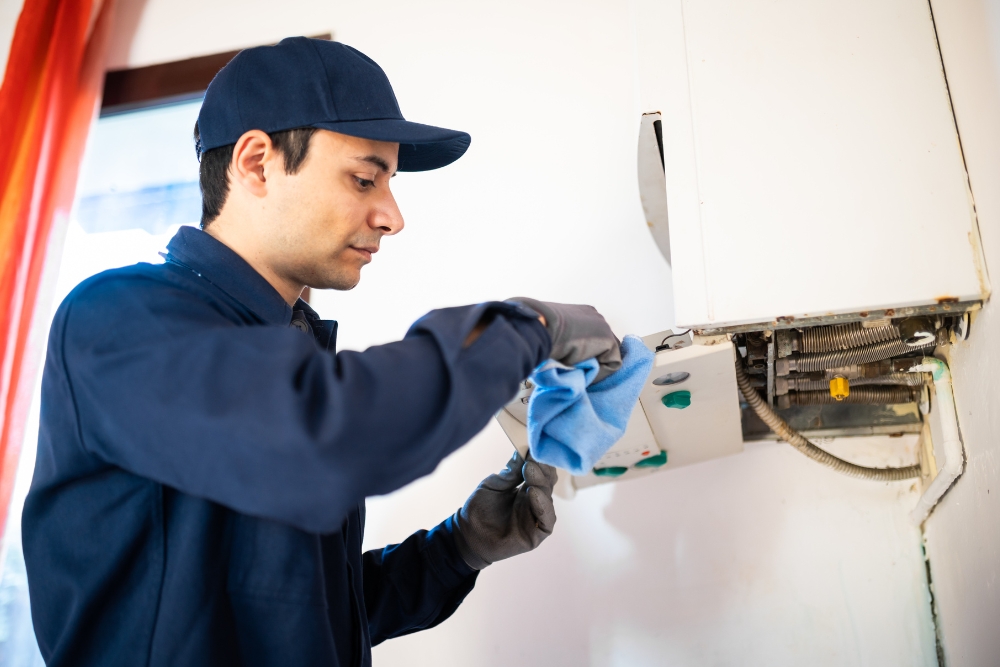
When to seek professional assistance
If you’ve tried troubleshooting the common hot water system problems mentioned earlier and haven’t been able to resolve the issue, it may be time to seek professional assistance. A licensed plumber can help diagnose and repair more complex issues with your hot water system.
They have the expertise and experience to identify internal problems that may not be visible, such as faulty elements or thermostats. Don’t hesitate to reach out for professional help if you’re unsure how to fix the problem yourself or if you want to ensure a thorough and accurate repair.
Identifying and fixing complex issues
Sometimes, hot water system problems can be more complex and difficult to diagnose. These issues may require the expertise of a professional plumber who has experience in dealing with hot water systems.
They have the knowledge and tools to identify and fix these complex issues efficiently. Whether it’s a faulty thermostat, a malfunctioning pressure relief valve, or an inefficient heating element, a licensed plumber can assess the problem and provide effective solutions.
Remember, attempting to fix complex issues on your own may lead to further damage or even personal injury. So, if you’re facing intricate hot water system problems, it’s best to seek professional assistance for prompt resolution.
Swift Hot Water Solutions for Your Space
In conclusion, understanding and addressing common hot water system problems can ensure that you always have access to reliable hot water. By troubleshooting and making necessary repairs, such as checking for leaks, adjusting temperature settings, and replacing faulty components, you can prevent major issues and extend the lifespan of your hot water system.
Additionally, if you encounter complex or persistent problems, it is advisable to seek professional assistance from a licensed plumber who can identify and fix the issue efficiently.
Dealing with common hot water system problems? Hot Water Repairs Today has the solutions you need for reliable repairs. Don’t let issues like leaks, temperature fluctuations, or strange noises disrupt your comfort – take action now. Contact us for expert assistance in diagnosing and resolving common hot water system problems. Trust Hot Water Repairs Today to be your go-to partner in ensuring a consistently efficient hot water supply. Don’t wait for minor issues to escalate – reach out now and experience the expertise of Hot Water Repairs Today. Act today for a hot water system that operates flawlessly. Contact us now!

